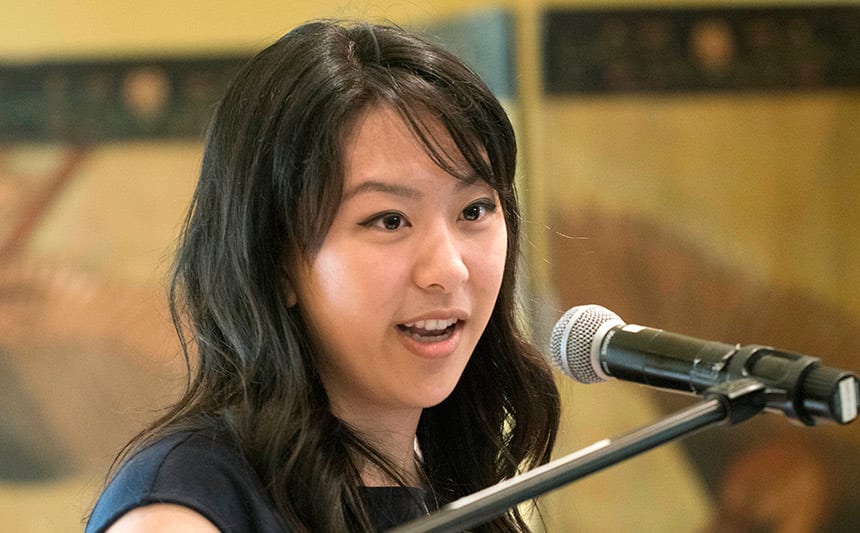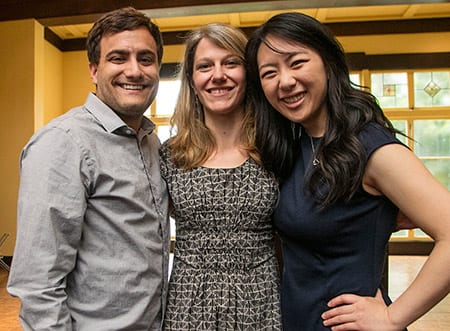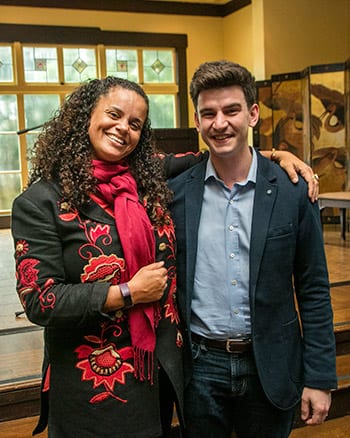
By Andrew Cohen
For two years, members of Berkeley Law’s Death Penalty Clinic knew what to expect from Salena Tiet ’17: stellar work, extraordinary dedication, and razor-sharp attention to detail. But while listening to her acceptance speech for the school’s annual Sax Prize for Clinical Advocacy, they never could have imagined a source of her inspiration.
“The world ain’t all sunshine and rainbows,” said Tiet, quoting Sylvester Stallone’s speech to his son in Rocky. “It’s a very mean and nasty place, and I don’t care how tough you are, it will beat you to your knees and keep you there permanently if you let it … It ain’t about how hard you’re hit. It’s about how hard you can get hit and keep movin’ forward … That’s how winning is done. You have to be willing to take the hits.”
Named for the late Brian Sax ’69, a respected San Francisco litigator and Berkeley Law lecturer, the prize honors a graduating legal clinic student who displays excellence in advocacy and professional judgment. Tiet was chosen from a group of nominees who worked at the school’s legal clinics.
“In an inherently unequal system, we will undoubtedly experience setbacks and failures,” Tiet said. “But, it is not the number of losses we suffer. Rather, it is how we use the skills we gain in clinics to deal with those losses that will define us as advocates.”
During an April 24 ceremony at the Bancroft Hotel, Tiet, a first-generation American, described why “joining the Death Penalty Clinic was the best decision I made in law school.” She traveled to different states, worked on complex legal claims, and collaborated with talented advocates and investigators. But for Tiet, raised by a single mother who came to the United States as a refugee, the best parts of her clinical experience were often the most difficult.
Uncharted waters
In two years at the clinic, “I have stepped out of my comfort zone more times than I can count,” she said. “I have knocked on doors, spoken to strangers, and been brusquely ushered off porches. But I have also learned more lessons than I can remember … Stepping out of my comfort zone once in a while is a small price to pay in exchange for the satisfaction I feel knowing that every assignment I work on is an active step toward saving my client’s life.”

Tiet thanked her clinical teammate Michael Besser and supervisor Kathryn Miller ’07, who called her “a force of nature. Salena can do it all. She is a gifted writer, a skilled investigator, and a relentless advocate. I’m not sure that I’ve ever met a person who works as hard as Salena does.”
Miller described Tiet’s tireless advocacy of death-row clients in Arizona and South Carolina. In a recent state habeas petition on behalf of an Arizona client, Tiet wrote the pivotal jury misconduct claim, five other claims, and a critical portion of the client’s social history.
John Mills, an experienced death penalty attorney partnering with the clinic on the case, described her work as of “the highest quality” and said she has repeatedly “provided comprehensive treatment of complex key legal issues key to the success of our case.”
While the clinic requirement is 16 hours a week, Miller said Tiet frequently clears 40 hours. She is currently working with Besser to draft a petition for writ of certiorari to the U.S. Supreme Court on behalf of a South Carolina client.
“Salena has given up portions of her winter, spring, and summer breaks to do clinic work,” said Miller, who noted that Tiet will join the Los Angeles Public Defender’s office this fall. “The LA DA’s office should be very afraid.”
Honorable Mention award
Nicholas Miller-Stratton ’17 received the Sax Prize Honorable Mention Award for his tenacious work in the Housing Program of the East Bay Community Law Center (EBCLC). For the past four semesters, Miller-Stratton fought to protect and preserve housing for low-income tenants in Oakland and Berkeley, defending more than 20 tenants and their families in eviction lawsuits.

“I kept working there because the housing crisis in the Bay Area just makes me outraged,” he said. “Witnessing the full-frontal assault on people’s wellbeing through mass evictions in the name of increased market rent, more return on investments, more efficient capital structures … all of it just makes me want to scream.”
Housing Practice clinical supervisor Meghan Gordon ’11 described Miller-Stratton as a fierce advocate for tenants, wizard of numbers, spreadsheet guru, and subsidized housing expert. He drafted several complex dispositive motions, successfully defended a Section 8 tenant in an administrative termination hearing, conducted depositions and prepared many other pleadings on tenants’ behalf.
“He has the patience of a saint—spending hours on end on the phone with a client in crisis—and unparalleled warmth felt by colleagues, classmates and clients all the same,” Gordon said.
She also relayed thoughts from one of his former clients, a single disabled man facing eviction from his home of many years. Thanks to Miller-Stratton’s diligence, the client was paid $25,000 in relocation assistance, received a $7,000 rent waiver and was given eight months to move.
“Nick was always available to me during the most trying time of my life,” he wrote to Gordon in an email. “His calm demeanor and methodical, meticulous and diligent manner belied a friendly, caring soul—a guy who genuinely cared about my situation and was a powerful asset as well as an ally.”
Earlier in the ceremony, clinical leaders Elisabeth Semel (Death Penalty Clinic); Tirien Steinbach ’99 (EBCLC); Claudia Polsky ’96 (Environmental Law Clinic); Laurel Fletcher (International Human Rights Law Clinic); Stephanie Campos-Bui ’14 (Policy Advocacy Clinic), and Brianna Schofield ’12 (Samuelson Law, Technology & Public Policy Clinic) described their clinics’ achievements over the past year, fueled by the hard work and commitment of their students.